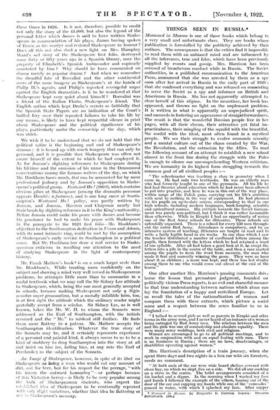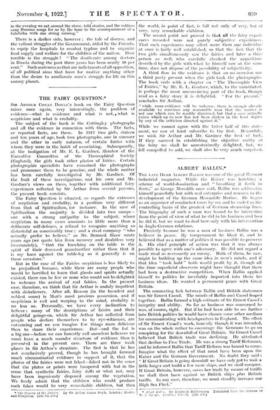THINGS SEEN IN RUSSIA.* Marooned in Moscow is one of
those books which belong to a very small and unfortunate class. They are books whose publication is forestalled by the publicity achieved by theft authors. The consequence is that the critics find it impossible to read them with an unbiased mind and are influenced by all the inferences, true and false, which have been previously supplied by events and gossip. Mrs. Harrison has been accused of treacherous conduct while in Russia. The Soviet authorities, in a published communication to the American Press, announced that she was arrested by them as a spy soon after her arrival in Russia in the early part of 1920 ; that she confessed everything and was released on consenting to serve the Soviet as a spy and informer on British and Americans in Russia. She has not apparently attempted to clear herself of this stigma. In the meantime, her book has appeared, and throws no light on the unpleasant problem. It is written in what is apparently an unprejudiced spirit, and succeeds in fostering an appearance of straightforwardness. The result is that the wonderful Russian people live in her pages, with all their charm, their attractive yet fatal im- practicalness, their mingling of the squalid with the beautiful, the sordid with the ideal, most often found in a mystical people. We see their struggle to evolve economic serenity and a mental culture out of the chaos created by the War, the Revolution, and the ostracism by the Allies. To read the following account of an attempt to establish a new school almost in the front line during the struggle with the Poles is enough to silence our uncomprehending Western criticism. We see humanity in its highest form struggling towards the common goal of all civilized peoples :- " The schoolmaster was teaching a class in geometry when I came in. He had only two textbooks. He was an elderly man who had formerly taught in one of the gymnasia. All his life he had had theories about education which he had never been allowed to put into practice, and here he was in this out of the way place, within range of the Polish guns, carrying out his life's ambition with next to nothing in the way of equipment. He had planned for his pupils an up-to-date course, corresponding to that in our high schools, including modern languages, book-keeping, scientific and agricultural courses. His attitude towards the Soviet Govern- ment was purely non-political, but I think it was rather favourable than otherwise. While in Krupki I had an opportunity of seeing one of the Red Army schools for illiterates. These schools arc splendidly organized. There is a school for every 250 men through- out the entire Red Army. Attendance is compulsory, and by an intensive system of teaching, illiterates are taught to read and to write a fairly legible hand in six weeks. In one class which I saw the teacher distributed a number of cardboard letters among the pupils, then formed with the letters which he had retained a word of one syllable. After all had taken a good look at it, he swept the letters into a pile in the centre of the table, and then a race started among the pupils to form the word from memory, the man who made it first and correctly winning the game. They were as keen about it as children ; a score was kept, and there was hot rivalry among them to sec who would come out ahead at the end of the lesson."
One after another Mrs. Harrison's passing comments this,. home the lesson that premature judgment, founded on politically vicious Press reports, is an evil and shameful menace to that true understanding between nations which alone can lay the foundation of a happy and recivilized Europe. Let us recall the tales of the nationalization of women and compare them with these extracts, which picture a social sense and a respect between the sexes familiar to us in England :- " I talked to several girls as well as parents in Krupki and other towns in the army zone, and I never heard of an instance of a woman being outraged by Red Army men. The relation between the men and the girls was one of comradeship and absolute equality. There were many army weddings, both civil and religious.
Women are encouraged to go to all political meetings, and to work in conjunction with and on equal footing with men. There is no feminism in Russia ; there are no laws, disadvantages, or disabilities operating against women."
Mrs. Harrison's description of a train journey, when she spent three days and two nights in a box car with six foresters, needs no comment.
" At both ends of the. car were wide board shelves covered with clean hay, on which we slept, five on a side. We did all our cooking on a stove in the centre. The toilet arrangements consisted of a tin bucket and a dipper. In the morning when I washed nay face and hands I followed the example of the others, leaning out of the door of the car and cupping my bands while one of the ` comrades ' poured in water, with which I splashed my face. After supper • Marooned in Moscow. By Marguerite E. Bonbon. London ; Thornton Butterworth. Real
in the evening we sat around the stove, told stories, and the soldiers sang Russian songs for us by the hour to the accompaniment of a balalaika with one string missing."
There is a darker side, however ; the tale of disease, and the valiant struggles of the Government, aided by the Friends, to equip the hospitals to combat typhus and to organize food supply and welfare for the children of the nation. How terrible is the struggle I " The death-rate among doctors in Russia during the past three years has been nearly 40 per cent." Such sentences as that are indictments of all opposit ion, of all political aims that have for motive anything other than the desire to ameliorate man's struggle for life on this uneasy planet.







































 Previous page
Previous page